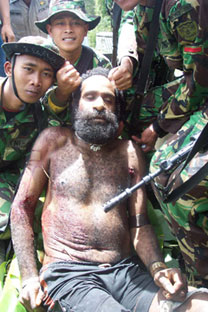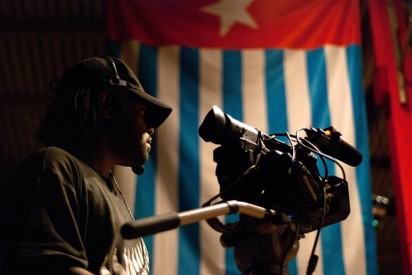West Papua to remain closed to international media
October 12, 2013
 Sign the Avaaz petition here urging the Indonesian Government to stop the killings and open up West Papua to international media
Sign the Avaaz petition here urging the Indonesian Government to stop the killings and open up West Papua to international media
—
Fresh hope that Indonesia would allow foreign journalists and observers freely into occupied West Papua, appear to be unfounded.
The Sydney Morning Herald reports that the governor of Papua province, Lukas Enembe, said on Wednesday that he wanted to welcome reporters and non-governmental organisations to the area.
“There’s nothing that needs to be covered up. That would only raise questions. They can see the development we have made and inform others that Papua is a safe place,” he said, as quoted by the Jakarta Globe newspaper.
But the hope for fresh openness was quickly squashed by the central government in Jakarta, which still requires journalists to apply for special permits to go to the province, and to take secret police officers with them if they are approved.
Journalists must apply to the Indonesian department of foreign affairs for special permission to travel, giving all information about who they will interview, when and where.
Their application is then considered on a Thursday evening in what’s called the “clearing house” meeting, involving 18 Indonesian government departments, including police and the military.
Many applications for travel features to the Raja Ampat diving site are approved, but most applications for serious reporting are rejected.
Fairfax Media has confirmed with the Indonesian department of foreign affairs that the “clearing house” process remains the only legal route to West Papua.
Journalists who travel without permission face being put on a blacklist banning them from future visits to Indonesia, and correspondents resident in Indonesia confront the possibility that their immigration status may be revoked.
Even the International Committee for the Red Cross has been banned from the province.
Mr Lukas, who was elected in April, does not have the power to overturn the policy of the central government. His province is represented at the clearing house meeting by the Home Affairs ministry.
However his comments could be construed as a welcome change of tone.
And Ruben Magai, the head of Commission A, which is responsible for mass media at the provincial parliament, also urged the central government to ease up, saying: “If security is the reason I don’t think Papua is in some kind of war state or something like that nowadays.”
But western journalists have been assured on numerous occasions in the past that permission to travel will be forthcoming and those promises have, in the past, turned out to be largely false.
